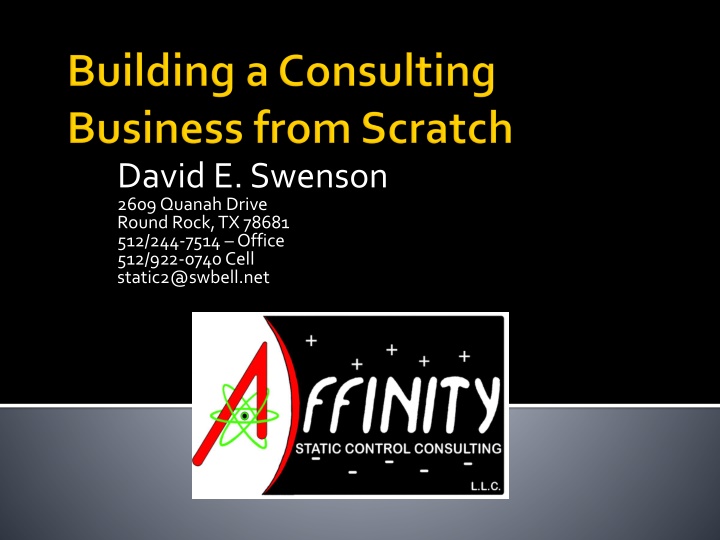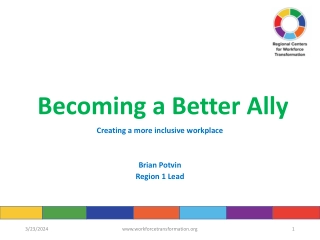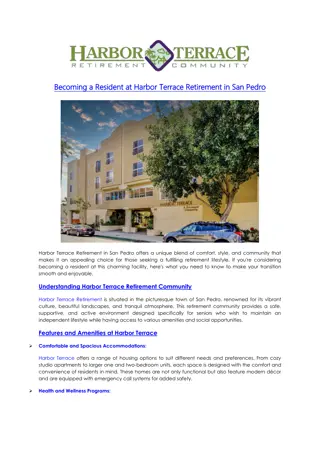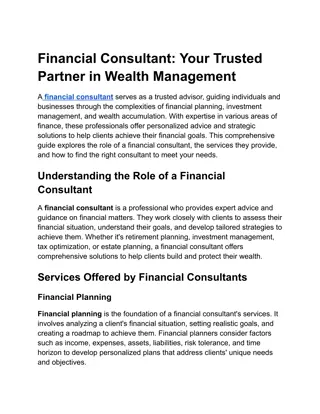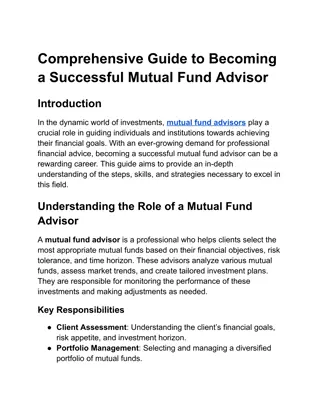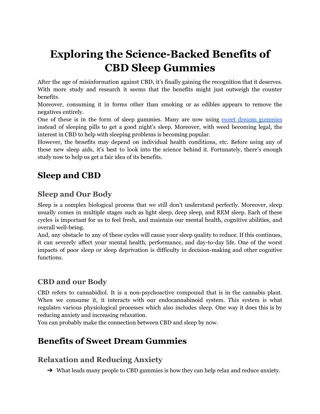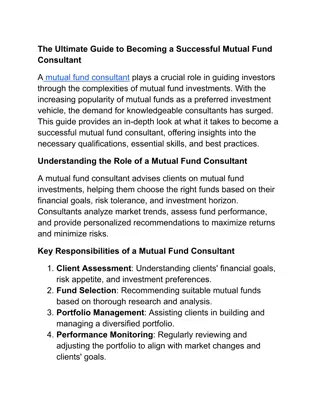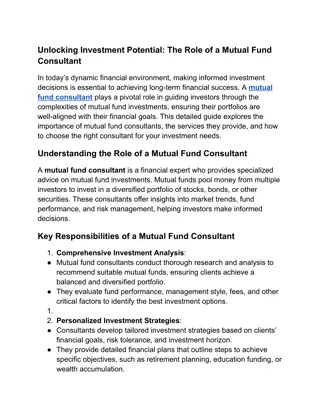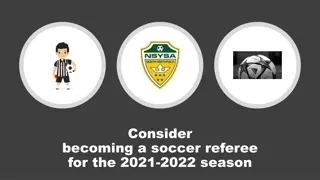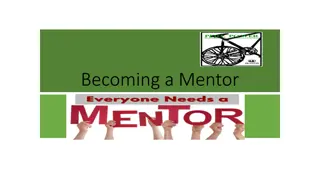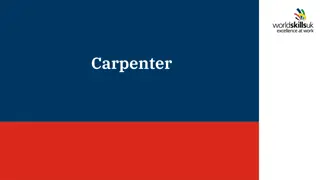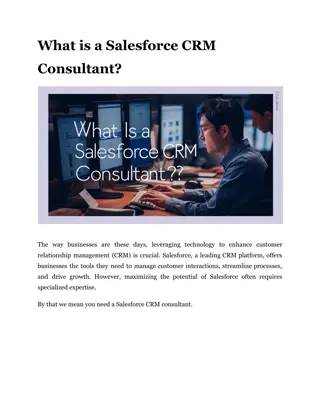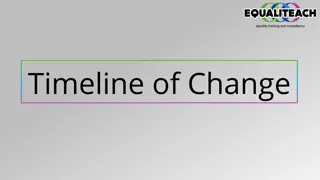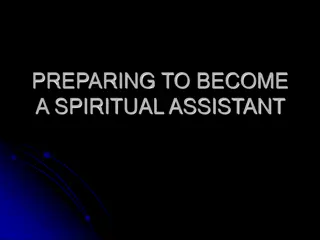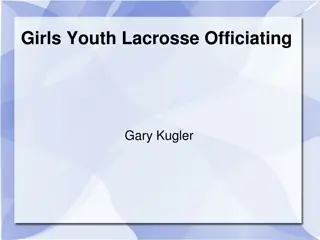Becoming a Consultant: Key Considerations
If you are considering a career as a consultant, there are important factors to weigh. Assess the need for your expertise, potential competition with current or past employers, and the basis of your skills. Explore entity formation options for your consulting business and the importance of legal and financial guidance in the process.
Download Presentation

Please find below an Image/Link to download the presentation.
The content on the website is provided AS IS for your information and personal use only. It may not be sold, licensed, or shared on other websites without obtaining consent from the author.If you encounter any issues during the download, it is possible that the publisher has removed the file from their server.
You are allowed to download the files provided on this website for personal or commercial use, subject to the condition that they are used lawfully. All files are the property of their respective owners.
The content on the website is provided AS IS for your information and personal use only. It may not be sold, licensed, or shared on other websites without obtaining consent from the author.
E N D
Presentation Transcript
David E. Swenson 2609 Quanah Drive Round Rock, TX 78681 512/244-7514 Office 512/922-0740 Cell static2@swbell.net
One who gives professional advice or services Not always considered a good thing but the service provided may be important and save a client lots of $$ Generally an independent contractor But can be associated with a larger group The advice or service provided is not available within the organization or at least not a price they want to pay (time and money) This is important to understand the potential client would not be talking to you if they did not need something you can provide it also helps to establish what you can charge
First question: Do you have a regular paying job? Keep it as long as you can. Second Question: Do you have an expertise that is in limited supply in the market area you intend to work in? If not, try to keep the regular job as long as you can
If you want to become a consultant, will you be in competition with your current or recent employer? Are you intending to do work that is similar to what you were doing for an employer? Will they help you or give you assistance? Send you work? Give you leads? Sue you for breach of contract or breach of a confidentiality agreement?
Is your consulting idea outside of or different than what you are doing now? What is the basis of your expertise? A passion or hobby that you know well? Do you have credentials to support your expertise? Are you going to continue your education in order to obtain expertise and possible credentials?
Forming a consulting company Sole Proprietorship Corporation Partnership LLC Might need help from an attorney and an accountant to establish your company You can do this yourself if you want to spend the time (it will be lots cheaper)
Establish a banking account Separate from your personal account(s) Learn Quick Books or some other accounting program Obtain an Employer Identification Number (EIN) Prepare a W-9 to give to your clients Obtain a number from Dun & Bradstreet Obtain a CCR Central Contractor Registration (for government work https://www.bpn.gov/ccr/ ) CCR registration is stopping the end of May 2012 SAM number replaces it System for Award Management
Long time dream to be my own boss Or nearly so Work for wife she is the CEO Until this consulting business started I didn t know I needed supervision 24/7
Able to retire during a downsizing effort at 3M Able to continue work in an area that was part of my normal routine Continuing involvement in a US industry association for over 30 years served as president and many other positions Well known in small industry Helped develop multiple industry standards
Even being well known in an area or (small) industry does not guarantee instant success: Known in a small circle but (as I found out) not so well outside of that circle Most business comes from outside of the known circle The inner circle does help with referrals Creates a need to become known to a broader audience
Web Site is critical Becoming or staying published helps to keep your name up on search engines Other Social Media May work for you depends on who you need to reach Advertising Depends on what you need to push Use media that reaches the intended audience
Brochures Business Cards Industry events Trade shows Conferences Panels Industry Associations get involved
Prepare operational plans for a facility to control static electricity in their processes Conduct audits to 2 industry standards (US and International) Material testing Process troubleshooting Training Expert witness
Hopefully an inquiry to your consulting firm will result in a request for a formal proposal or quote: Introduction What you intend to do for the client When you can deliver How much it will cost including an itemized list of anticipated expenses with a clause to allow revision if expenses change airfare Your company terms
Establish a file for each client or potential client: Much of the work you get may well be repeat business so treat your customers well you want them to come back to you Prepare reports like you are writing a best seller Reports reflect directly on the amount of care you have put into the work you have done Be sure of the facts, figures, charts, graphs, calculations, details and terminology in all reports Have someone else read all reports to assure clarity and accuracy including spelling and structure
Maintaining customer records is important Keeping track of expenses is critical You need to deduct all you can legally deduct Keeping up with your income and taxes will (maybe help) keep you out of jail
No matter what your consulting job consists of you will need some form of workspace: Office facility desk, storage and file cabinets Computer(s) Printers Fax (maybe not, but still comes in handy) Phone system Copier Vehicle?
Workshop? Lab? Technical equipment? Best to separate from your living space if you can (keep peace in family)
Can you find out what others in similar businesses charge? Without violating any laws! Will you have multiple rates for different activities? Sometimes necessary to reduce a standard rate to get certain work Charging for travel time seems objectionable to most clients
Hourly or daily rates Need to establish both Managing travel costs Depending on your business, travel is a burden to most clients Keep good records of all travel expenses and get reimbursed for all that you can direct deduction
Prepare invoices as soon as possible after work is completed Make sure you find out the proper way to submit invoices for each client Find out normal payment time for each client so you know when to expect payment Love your clients that pay quickly There are many that take a long time to pay ( it is very tough when the payment time is over 45 days) Your expenses will be due before you get paid
Keep a separate folder for all payments received Makes it easier at Tax time Keep a separate folder for your travel expenses Same reason Keep track of other business expenses and deductions monthly Keep yourself reimbursed
Be prepared for total immersion Be prepared to work longer hours than you ever did when you were working for a paycheck Be prepared for less time off Be prepared to enjoy work more than ever before
Establishing a consulting business is incredibly rewarding You will be busier than you have ever been in your life if you are fortunate
